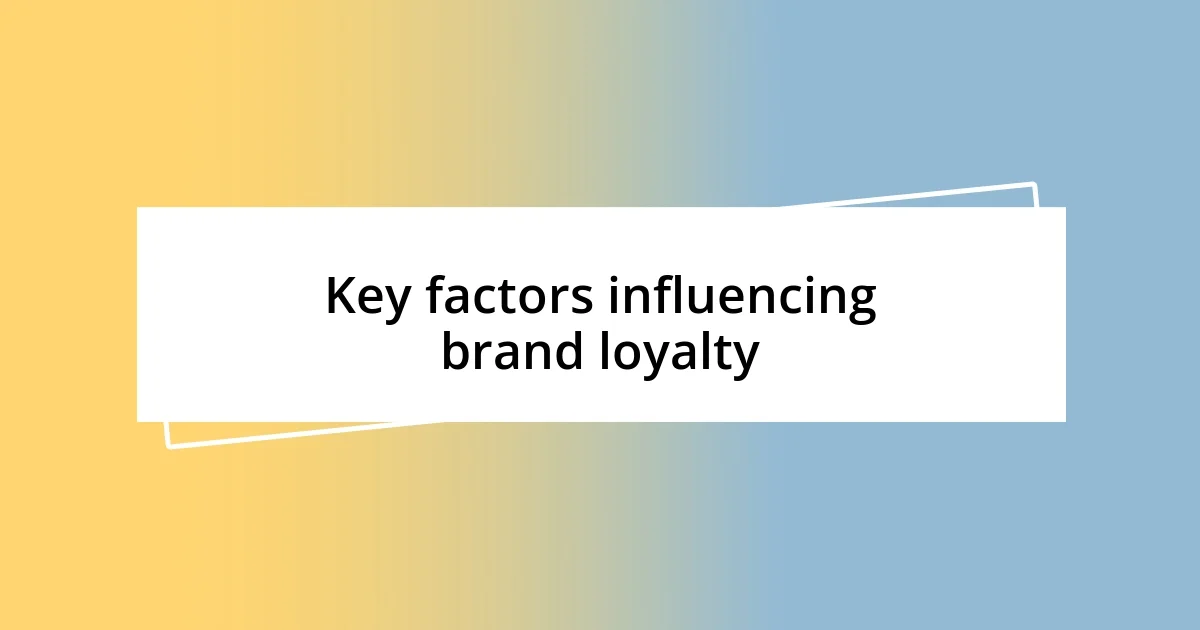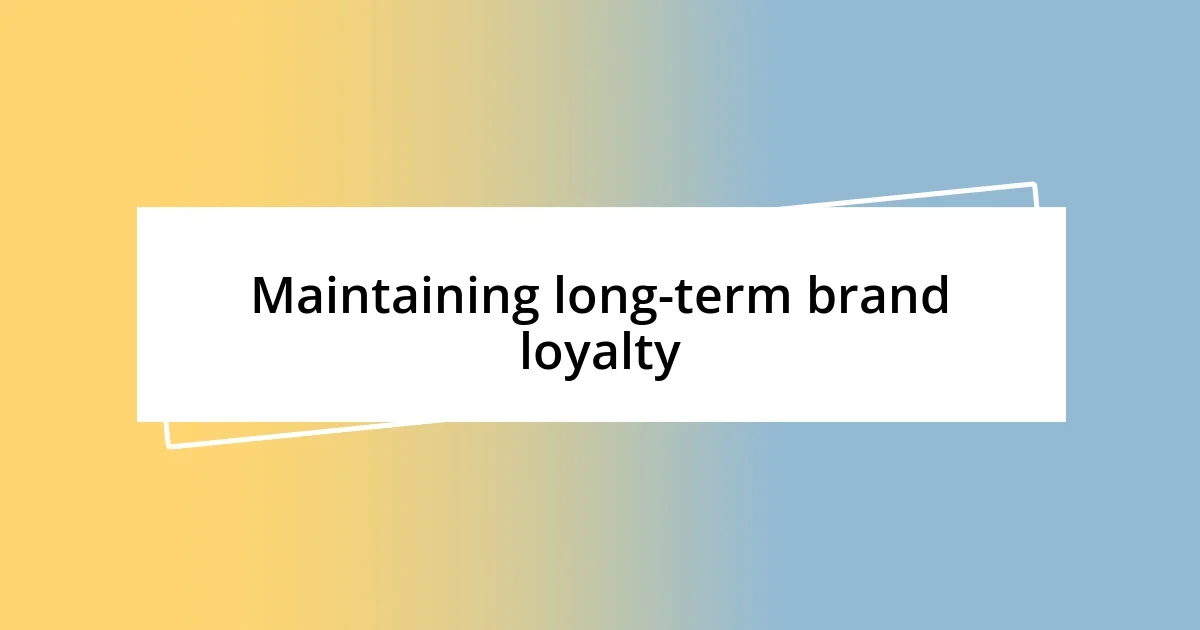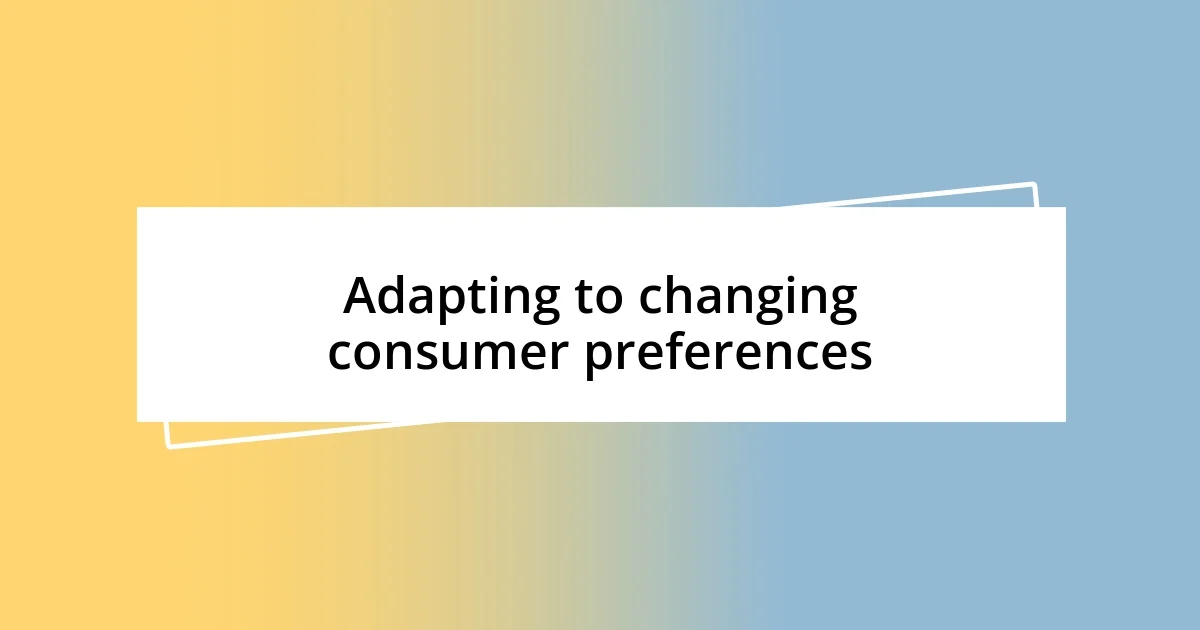Key takeaways:
- Brand loyalty fosters emotional connections, offering customers exclusive perks and the assurance of quality products.
- Trust, emotional resonance, and positive customer experiences are vital factors influencing brand loyalty.
- Brands that adapt to changing consumer preferences through feedback and innovation maintain long-term loyalty and relevance.

Understanding brand loyalty benefits
Brand loyalty brings a sense of emotional connection that can be incredibly rewarding. I remember switching to a particular coffee brand because it not only had the rich flavor I loved but also made me feel a part of a community of fellow enthusiasts. Isn’t it amazing how a simple choice can transform your daily routine into something more meaningful?
One of the benefits I’ve noticed is that loyal customers often enjoy exclusive perks, such as discounts or early access to new products. There’s something satisfying about being recognized for your commitment. Have you ever felt that thrill when a brand you adore acknowledges your loyalty? It’s like being part of an inside circle that understands your preferences and values.
Another advantage that really stands out to me is the assurance of quality associated with brands we trust. I often feel more confident purchasing products from a brand I’ve consistently chosen over the years, knowing exactly what to expect. Isn’t it comforting to know you can rely on certain brands during crucial moments, whether it’s buying a gift or choosing a reliable snack? This stability fosters not only loyalty but a deeper, sometimes unbreakable bond with the brand.

Key factors influencing brand loyalty
Brand loyalty is influenced by several key factors that shape our purchasing decisions. One major factor is trust. I remember the first time I tried a skincare product from a brand I had been eyeing; the glowing reviews reassured me. That initial leap of faith paid off, and it built a sense of trust that has kept me coming back ever since. Trust is foundational—once it’s established, it’s hard to let go.
Another essential factor is the emotional connection a brand fosters with its customers. I once chose a particular shoe brand because its marketing made me feel empowered and stylish, aligning perfectly with my self-image. This emotional resonance is powerful; it turns mere products into symbols of our identities and aspirations. Have you ever found a brand that spoke to you on that level? It’s quite an exhilarating feeling when your purchases feel like an extension of who you are.
Lastly, customer experience plays a pivotal role in fostering loyalty. When I had an issue with a product, the company’s responsive customer service made all the difference. They handled my inquiry promptly and genuinely, which cemented my loyalty even further. Good experiences encourage repeat purchases, while poor ones can easily drive customers away. It’s fascinating how a simple interaction can affect our long-term relationship with a brand.
| Key Factors | Description |
|---|---|
| Trust | Building trust through consistent quality and transparent practices encourages repeat purchases. |
| Emotional Connection | Brands that resonate emotionally with consumers create deeper connections and brand identification. |
| Customer Experience | A positive customer experience, especially in resolving issues, enhances loyalty and satisfaction. |

My personal brand loyalty experiences
I’ve had my share of loyalty experiences that have profoundly shaped my buying habits. One memorable instance was when I discovered a local bakery whose pastries were not only delicious but also consistently made with high-quality ingredients. The first time I bit into one of their croissants, the buttery flakiness made me feel like I was in a Parisian café. Knowing I was supporting a local business also created a sense of pride, making each visit feel special.
- The emotional warmth associated with supporting local brands is significant.
- Their commitment to sustainability resonates with my values.
- Experiencing their friendly service made every interaction feel personal.
Another brand that captured my loyalty is a well-known outdoor gear company. I remember my first camping trip using their equipment, filled with a mix of excitement and nerves. The gear performed flawlessly, and I felt a rush of confidence in nature, knowing I was well-supported. This experience turned into a solid trust in their products and a wonderful narrative in my adventures. Now, each time I gear up for a trip, I reflect on those moments of discovery and adventure, further solidifying my allegiance to them.
- Their products became part of my hiking stories, creating emotional ties.
- Engaging with their community through events deepened my connection.
- Their dedication to quality reassures me before every trip.

Strategies for building brand loyalty
When it comes to building brand loyalty, consistency is key. I recall a coffee shop that always served my favorite brew just right, time after time. This unwavering quality made me feel like a valued customer, not just another order in the queue. How often do you find a place that consistently meets your expectations? It’s quite rare and something that keeps me coming back.
Another effective strategy is creating engaging loyalty programs that reward customers for their commitment. I once signed up for a shoe retailer’s rewards program, and every purchase earned me points toward a future discount. Honestly, seeing those points accumulate felt like I was winning a mini-game every time I shopped. It added excitement and gave me a tangible reason to stick with the brand—who doesn’t love a good deal?
Lastly, transparency about brand values and practices resonates with many consumers, myself included. I remember being drawn to a brand that openly shared their sustainable sourcing and fair labor practices. This authenticity made me feel like my purchases were contributing to a larger purpose, aligning with my values. Have you ever felt that satisfaction in knowing your dollars are spent in a way that supports something you believe in? It’s a powerful motivator and deepens the loyalty I feel towards that brand.

Maintaining long-term brand loyalty
Whenever I think about maintaining long-term brand loyalty, I can’t help but reflect on my favorite sustainable clothing brand. I was initially drawn to them due to their commitment to eco-friendly materials. It felt like a breath of fresh air to wear clothes that not only looked good but also aligned with my values. Every time I put on a new piece, I experience a sense of pride knowing that I’m making a conscious choice for both my wardrobe and the planet. Isn’t it satisfying to wear something that resonates with your identity?
Another important aspect is the emotional connection brands can foster over time. I recall an online bookstore that consistently sends me personalized recommendations based on my reading preferences. It’s like having a thoughtful friend who knows what I want to read next. Each book arrival feels special, and it nurtures my relationship with the brand. How often do you find that in a retailer? That personalized touch has transformed my shopping experience into something memorable and enjoyable.
Moreover, I’ve noticed that brands that maintain open communication during the ups and downs of their journey tend to keep my loyalty intact. For instance, when a favorite cosmetics brand faced a supply issue, they reached out to their customers via email, explaining the situation and offering a small discount as a gesture of goodwill. I appreciated their honesty and transparency. It made me feel involved and valued, rather than just a number on their sales chart. Isn’t it comforting to know that a brand cares about you? This strategy has only deepened my loyalty to them.

Adapting to changing consumer preferences
Adapting to changing consumer preferences requires brands to be attuned to their customers’ evolving needs. I remember when my go-to snack brand shifted to a plant-based formula. At first, I was skeptical—would it taste the same? But to my surprise, not only did it taste great, but it also made me feel aligned with the growing health-conscious movement. Have you ever found yourself surprisingly loyal to a brand that took a risk in changing their product?
In my experience, the brands that truly thrive are the ones that actively seek feedback and innovate based on consumer insights. I once participated in a survey for my favorite tech gadget company, sharing my thoughts on their latest product release. Soon after, they incorporated some of my suggestions into their next version. That involvement made me feel heard and valued. How often do we get that chance to shape the products we care about?
Flexibility is crucial in this fast-paced market. For example, when a popular beverage brand introduced seasonal flavors based on customer feedback, my entire friend group got excited. I remember rushing to try their pumpkin spice flavor, which became an instant hit. The ability to surprise and delight their customers during different times of the year keeps their brand fresh and relevant in my mind. Have you ever been tempted to try something new simply because a brand understood your cravings? That connection keeps me coming back for more.














